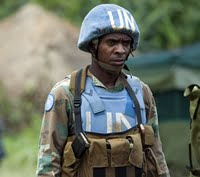Congo wants the U.N. peacekeepers out. Eleven years after one the world's biggest peacekeeping forces deployed to the Democratic Republic of Congo in a bid to tamp down on insurgent violence and oversee the resolution of a bloody civil war, DRC President Joseph Kabila has grown uncomfortable with the sometimes corrupt and ineffective blue-helmeted troops. "Don't do anything for us," Lambert Mende, Kabila's information minister, told the U.N. "We will do it ourselves."
Kabila's call for an end to the Mission of the U.N. in Congo (MONUC) comes at a time of renewed international interest in the DRC's overlapping conflicts, which by some measures represent the bloodiest war of the last decade, with at least 700,000 dead. Even as the DRC government and the U.N. begin negotiating cuts to MONUC's 20,000 troops -- most of them Bangladeshis, Indians and Pakistanis -- the U.S. Congress has passed a new law requiring the U.S. military to craft a strategy for defeating one of Congo's most dangerous rebel groups. The result is a Congolese political scene as bewildering as its scores of armed groups and its ever-shifting alliances with neighboring countries.
The first MONUC blue helmets arrived in Congo in 1999 to help mediate the end of a four-year civil war. That conflict pitted rebels backed by Rwanda and Uganda against the forces of then-DRC President Laurent-Desire Kabila, who had come to power just two years earlier at the head of his own Rwandan- and Ugandan-backed rebel army. After Kabila was assassinated in 2001, his son Joseph assumed power. The younger Kabila's ascent was cemented by his victory in a disputed 2006 election. With the slow cooling of tensions between Rwanda, Uganda and the DRC, the steadily growing U.N. force turned its attention to suppressing rebel violence in Congo's restive east.

